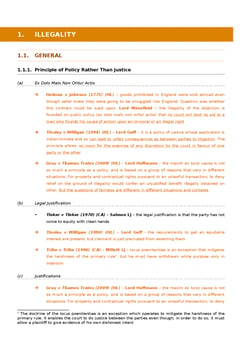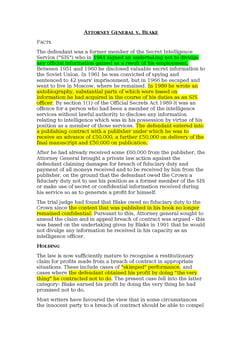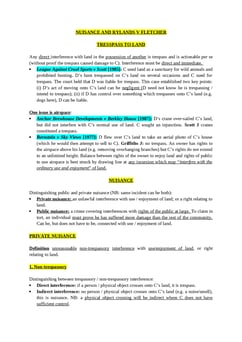Patel v Mirza [2016] UKSC 42
Judgement for the case Patel v Mirza
Table Of Contents
KEY POINTS
The court rejected a blanket application of the defence and considered the broader public policy implications when determining whether to deny a claim based on illegality.
-
The common law doctrine of illegality serves two main policy purposes, namely:
It prevents individuals from benefiting from their own wrongful actions, and
It ensures legal consistency by not condoning illegality, thereby avoiding a situation where the law indirectly rewards what it prohibits.
If a claimant meets the standard criteria for an unjust enrichment claim, they should not be prevented from pursuing their claim solely based on the fact that the money they seek to recover was used for an illegal purpose.
-
When determining if enforcing the claim would create inconsistency harmful to the legal system's integrity, the court should take into account:
The primary objective of the illegality involved and whether it would be furthered by rejecting the claim;
Any other pertinent public policy implications of denying the claim; and
Whether denying the claim would be a balanced and reasonable response to the illegality at hand.
FACTS
Mr. Patel provided Mr. Mirza with £620,000 to make bets on a bank's stock prices, using confidential information from insiders. Mr. Mirza expected to receive information about a government announcement regarding the bank from his contacts.
However, his expectations were not met, and he did not proceed with the intended bets. Surprisingly, Mr. Mirza did not return the money to Mr. Patel.
In response, Mr. Patel filed a lawsuit against Mr. Mirza to recover the funds. Mr. Mirza argued that the claim should be dismissed due to the illegal nature of their arrangement.
COMMENTARY
By recognizing that not all cases involving illegality should lead to a denial of remedies, the court sought to strike a balance between upholding the law's integrity and providing just outcomes for claimants who may have suffered genuine wrongs.
The decision in Patel v Mirza highlights the delicate balance between preventing unjust enrichment and upholding public policy.
The case clarifies that the Presumed Resulting Trust is not an absolute rule and can be rebutted in certain circumstances, particularly when enforcing it would be contrary to public policy.
RELATED CASES
For Further Study on Patel v Mirza
Need instant answers? Our AI exam tutor is here to help.
Ask questions 🙋 Get answers 📔 It's simple 👁️👄👁️
Our AI is educated by the highest scoring students across all subjects and schools. Join hundreds of your peers today.
Get StartedSimilar Cases
Related Product Samples
These product samples contain the same concepts we cover in this case.
| Aspects Of Obligations | Illegality Notes (24 pages) |
| Restitution of Unjust Enrichment BCL | Kleinwort Benson V. Lincoln City Council Notes (17 pages) |



